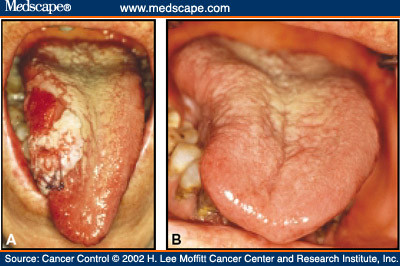Warning signs of tongue cancer
Tongue cancer is one of the most common types of oral cancer. Most patients discover the disease at a late stage because the initial symptoms of tongue cancer are unclear and often easily confused with other common oral diseases.
 |
The tongue is made up of a group of muscles that help us taste food, swallow and speak. A healthy tongue is pink and covered with small bumps called papillae. We use our tongues constantly, so if there is a problem with the tongue such as discoloration, pain or limited movement, it can cause discomfort, anxiety and worry. There are many causes of tongue abnormalities, but most tongue problems are not serious and most can be resolved quickly. However, in some cases, tongue abnormalities are a sign of some serious diseases such as oral cancer.
Who is susceptible to tongue cancer?
Research has shown that smokers are more likely to develop oral and tongue cancer than non-smokers. Smoking cigars, pipes, or cigarettes can all cause tongue cancer. Nicotine in cigarettes and cigarette smoke can damage different parts of the mouth; Drinking a lot of alcohol: A study has shown that 70-80% of people affected by oral or tongue cancer are alcoholics. Alcohol can stimulate cancer-causing genes and cause other malignancies; People exposed to high levels of radiation are also at higher risk of developing oral and tongue cancer; In addition, a person is at risk of developing tongue cancer when a family member has been diagnosed with the same disease.
Several symptoms may appear when there is a problem with the tongue.
Difficulty moving the tongue; Changes in size, the tongue may be too large or suddenly swollen; Changes in color, from the normal color of the tongue to white, red, or black; Pain or burning sensation on the tongue; Ulcers on the tongue; A sore tongue is often the result of an injury or infection; Biting the tongue while chewing, burns on the tongue due to temperature or chemicals;
Glossitis forms a painful swelling on the tongue; Aphthous ulcers appear in the tongue periodically, causing pain and discomfort when chewing, the cause may be due to trauma, infection, hormonal disorders, stress; Burning tongue syndrome is common in postmenopausal women or heavy smokers.
 |
| Image of tongue cancer. |
White tongue can be caused by: White patches on the tongue that do not peel off when scraped (leukoplakia). Although not dangerous, leukoplakia can be a precursor to cancer.
Red tongue can be caused by: Folic acid and vitamin B12 deficiency.
Black tongue: This is caused by the papillae of the tongue becoming too long. This makes them more likely to harbor bacteria. As the bacteria grow, it can cause the tongue to turn black. This condition is uncommon and is more likely to occur in people who do not practice good oral hygiene. People who take antibiotics and chemotherapy, and people with diabetes may be more likely to have black hairy tongue.
Oral thrush: white patches in the mouth that may disappear when scraped off, leaving a bleeding surface. Oral thrush is most common in infants, the elderly, people with poorly cleaned dentures, people with weakened immune systems, HIV, diabetes, and after prolonged use of antibiotics.
Geographic tongue: multiple red spots surrounded by irregular, rough white borders, resembling a map. Usually no treatment is required because it does not cause any discomfort.
Without regular and proper tongue cleaning, bacteria in the oral cavity convert food secretions and saliva into volatile sulfur compounds that cause bad breath.
Warning signs of tongue cancer
Tongue cancer often manifests as: lumps on the tongue, tongue pain, difficulty swallowing, ulcers...
Lumps on the tongue: appearing on the side of the tongue that touches the teeth can develop tumors. If these tumors are not treated, they will grow larger and ulcerate. The tumors can be red or white, making it difficult to eat, chew, or even drink water.
Tongue pain: This is a symptom that appears in the fourth stage of cancer, because the early stages are usually painless. You will feel pain when chewing and swallowing. If the malignant tumor grows larger, there may also be pain in the ear.
Difficulty swallowing: Even if there are no pimples or lumps on the tongue, women with this type of cancer still feel that there is a tumor in the throat that makes it difficult for them to swallow. Or when tongue cancer develops, the body's immune system weakens, causing ulcers and mouth ulcers.
According to SK&DS
| RELATED NEWS |
|---|

